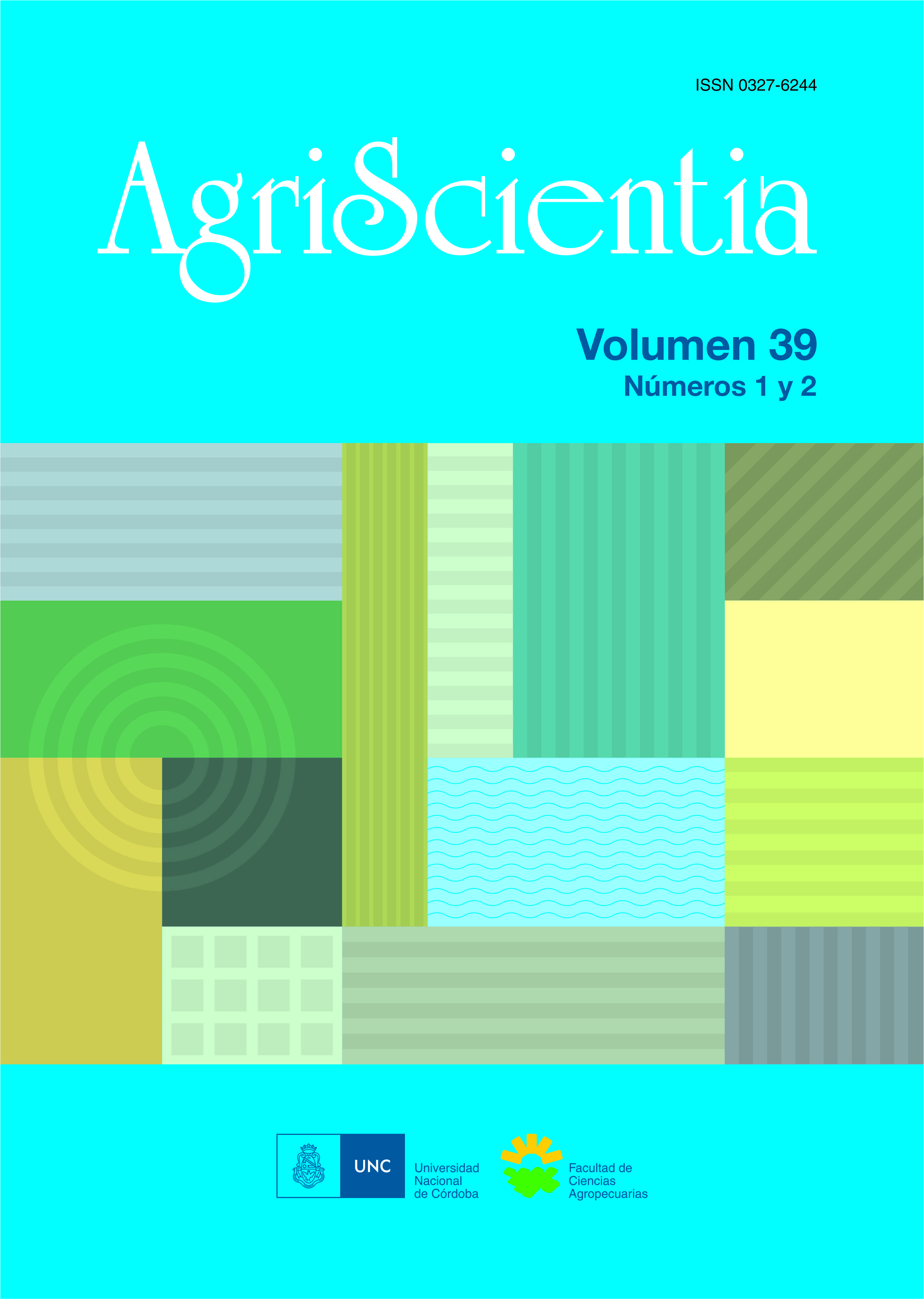Relationship between soybean delayed harvest and the presence of pathogens on seeds and stubble
Main Article Content
Abstract
Soybean delayed harvest may affect the sanitary seed quality, and thus itsuse for the following sowing season. The seed pathogens negatively affect the seed vigor and the normal seedling development hence affecting optimum crop implantation. The goal of this study was to assess the effect of the soybean delayed harvest due to adverse climatic conditions on the incidence of seed. The assessments were carried out during two seasons (years 2016 and 2018) in Pergamino, province of Buenos Aires, Argentina. The seeds and stems sanitary analyses were carried out using a blotter test and moist chamber respectively. The fungal reproductive structures were observed through morphological studies under stereoscopic and optical microscope. The results of this study showed that soybean delayed harvest due to adverse climatic factors significantly increased the incidence of seed pathogens (p < 0.0001) and the presence of fungal reproductive structures on the stems (p < 0.0001).
Article Details

This work is licensed under a Creative Commons Attribution-ShareAlike 4.0 International License.
How to Cite
References
Agarwal, V. K. y Sinclair, J. B. (1987). Principles of Seed Pathology. New Delhi: CRC Press.
Almeida, A. M. R., Ferreira Saraiva, O., Bouças Farias, J. R., Almeida Gaudêncio, C., Torres, E. (2001). Survival of pathogens on soybean debris under no-tillage and conventional tillage systems. Pesq. agropec. bras. 36, 1231-1238. http://dx.doi.org/10.1590/S0100-204X2001001000003.
Baird, R. E., Mullinix, B. G., Peery, A. B y Lang M. L. (1997). Diversity and Longevity of the Soybean Debris Mycobiota in a No-Tillage System. Plant Disease, 81, 530-534. http://dx.doi.org/10.1094/PDIS.1997.81.5.530 Base de datos.
European and Mediterranean Plant Protection Organization [EPPO] (1954). Danger from seed-borne diseases. A practical approach to the problem of international safeguard. Report on the working party on seed-borne diseases. EPPO, Paris.
Ivancovich, A. (1992). Enfermedades del tallo de la soja. En Enfermedades del cultivo de soja (11). INTA Pergamino Buenos Aries: INTA.
Ivancovich, A. (2011). Enfermedades de soja: diagnóstico y manejo. Buenos Aires: INTA.
Ivancovich, A. y Lavilla M. (2015a). Problemas sanitarios relacionados a la germinación de la semilla de soja a campo. 2018, de INTA Pergamino, Buenos Aries. http://inta.gob.ar/documentos/problemas-sanitarios-relacionados-a-la-germinacion-de-la-semilla-de-soja-a-campo
Ivancovich, A. y Lavilla M. (2015b). Eligiendo la mejor semilla. 2018, de INTA Pergamino Buenos Aries. http://inta.gob.ar/noticias/eligiendo-la-mejor-semilla
Ivancovich, A., Lavilla M. y Caamaño, A. (2016). Deterioro de la calidad sanitaria de los granos de soja por cosecha demorada. 2018, de INTA Pergamino, Buenos Aries. http://inta.gob.ar/sites/default/files/inta_pergamino_deterioro_de_la_semilla_a_campo_por_cosecha_demorada.pdf
Ivancovich, A., Lavilla M. y Formento, N. (2018). Antecedentes del cancro del tallo en soja causado por Diaporthe caulivora en argentina. En Libro de resúmenes del 1° Taller nacional de enfermedades en cultivos extensivos. Tema: Cancro por Diaporthe/Phomopsis en soja y girasol. Diagnóstico y manejo. (4). Pergamino, Buenos Aires: UNNOBA.
Jacobsen, B. J., Halin, K. S., Swanson, S. P., Lambert, R. J., Beasley, V. R., Sinclair, J. B., Wei, L. S. (1995). Occurrence of fungi and mycotoxins associated with mold damaged soybean in the Midwest. Plant. Dis. 79, 86-88. http://www.apsnet.org/publications/PlantDisease/BackIssues/Documents/1995Articles/PlantDisease79n01_86.PDF
Lavilla, M., Ivancovich, A. y Martinez, M. (2018). Consecuencia de los factores climáticos adversos sobre la calidad de la semilla de soja en la zona núcleo. 2018, de Engormix Chacabuco Buenos Aires. https://www.engormix.com/agricultura/articulos/consecuencia-factores-climaticos-adversos-t42217.htm
Munkvold, G. P. (2009). Seed Pathology Progress in Academia and Industry. Annu. Rev. Phytopathol. 2009. 47:285-311. www.annualreviews.org
Neergaard, P. (1986). Screening for plant health. Annual review of phytopathology, 24(1), 1-17.





